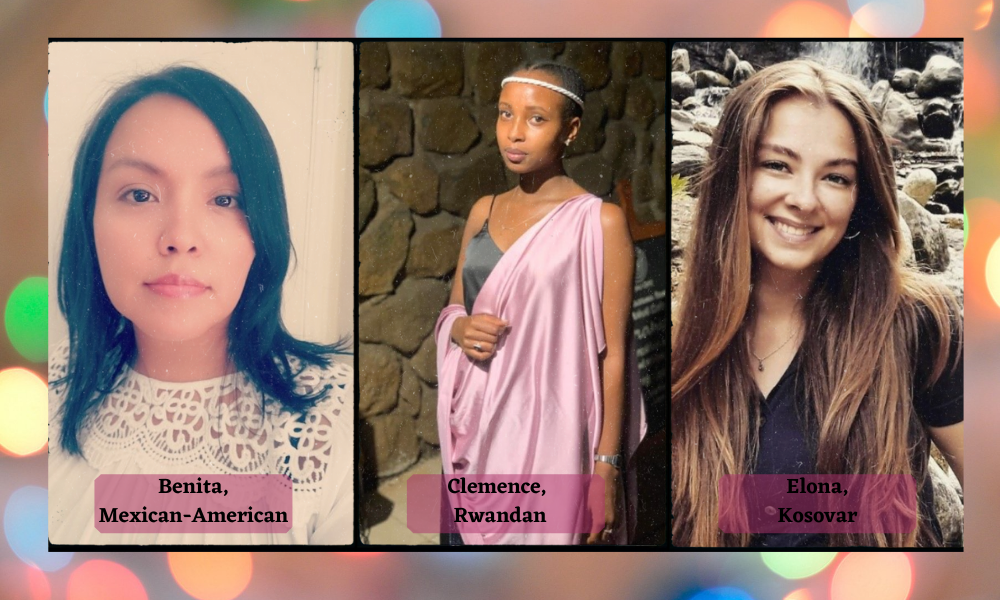Feeling Festive?
College of Education
SUMMARY: Around the world, holidays fill the social calendar and cultural schedule with a wide range of events and celebrations. During these feasts joy, peace, and happiness are all brought together.
By Xixëllonjë Nebihu
Around the world, holidays fill the social calendar and cultural schedule with a wide range of events and celebrations. During these feasts, joy, peace, and happiness are all brought together.
Getting people together is at the heart of what we love about having celebrations around the world. The festivals differ but all involve gathering family and friends in one place to inspire one another and continue on traditions that have been passed down through generations. Some of our College of Education students, from Mexico to Rwanda to Kosova, celebrate different holidays.
Benita, a Mexican-American student in the Equity and Cultural Diversity M.Ed. program, says she and her family celebrate all major holidays, including Christmas, Easter, Thanksgiving, and Mexico's Independence Day. Hispanics celebrate Christmas on December 24th.
Food plays a vital role throughout the holidays. Benita's family cooks a variety of traditional Mexican dishes, but they also like experimenting with new recipes. They celebrate some holidays with friends and others with family.
When asked what she enjoys most about the holidays, Benita responds, “Having the opportunity to be with family and friends. There is always plenty of food, and so much fun, and laughter, those are the memories that really stick with you, just being around the table with your family and just laughing and joking, just having a good time.”
Similarly, Clemence, a Rwandan student in the Equity and Cultural Diversity M.Ed. program, celebrates Christmas, Easter, and other holidays in the same way. Unlike Benita’s, her Christmas celebration falls on December 25th, but she spends the holidays with her family. Clemence is ecstatic about the approaching holidays. “Classes are over, work is off, you see people shopping, and you see Christmas decorations. It is a happy time. That’s one thing I love. Also, the music changes. Everyone is playing Christmas songs. Kids usually get new Christmas outfits.”
Rwanda is a country that thrives on celebrations. They have Christmas, Easter, and Eid celebrations (religious Muslim feasts). Whether you are Christian, Muslim, or anything else, it makes no difference to their festival. Everyone talks about it, and food is a big part of the holidays in Rwandan families, just like it is in Mexican families. Brochette (goat meat) is one of the main dishes served at Rwandan holiday meals.
Elona, a Kosovar student in the Adult Education/Human Resource Development M.S.Ed. program, talks about her country's holidays. New Year's Day and Independence Day are two of them, but the most well-known holidays are Bajram and Kurban Bajrami (also known as Eid), both religious feasts. They do not have a particular date, but the first follows after Ramadan, which means “breaking the fast,” and Kurban Bajrami is a festival of sacrifice. Traditionally, sheep and goats are slaughtered and distributed to needy families.
During these holidays, Elona spends time with her family and relatives and they visit each others’ homes. The main dishes served at Eid feasts are rice, baklava, and rice pudding. Children feel the happiest because they receive gifts from everyone.
As we see through these different cultures, people love to spend their holidays surrounded by the people they cherish the most. They all enjoy the same things, such as the food delicacies and traditions that have been through generations. Gift-giving is a tradition of some of the holidays, especially for Eid and Christmas. Everyone enjoys cultural and religious feasts; therefore let us all rejoice together for peace and happiness.
